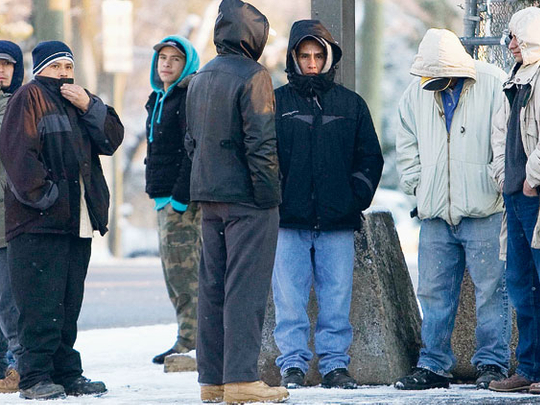
There is now a danger that the biggest fallout from the credit crisis is the creation of a lost generation of young people who never make the transition from school to work.
The US job figures for December weren't good and much worse than most commentators had expected. Payrolls fell by 85,000 last month after a gain the previous month.
About 1.7 million Americans left the workforce from July through December, a 1.1 per cent drop and the biggest six-month decrease since 1961. The participation rate last month fell to the lowest level in 24 years. An exodus of discouraged workers from the market kept the US unemployment rate from climbing higher than 10 per cent in December. Had the labour force not decreased by 661,000 last month, the jobless rate would have been 10.4 per cent.
The slowness of the recovery on the jobs front hits the young especially hard because youth employment is more sensitive to cyclic changes than it is for older workers.
From December 2008 to December 2009, the employment of 16-24 year olds in the US fell by 1.78 million, or a third of the total drop in employment of 5.4 million. In the UK, total employment fell over the last 12 months by 432,000 while the employment of 16-24 year olds fell by 365,000, or a remarkable 85 per cent of the total.
Unemployment rates for individuals younger than 25 are currently 21 per cent in the euro area and 19 per cent in the US They are especially high in Spain (44 per cent), Ireland (29 per cent) and Sweden (27 per cent) as well as in most of the countries that joined the European Union in 2004, including Latvia (36 per cent) and Lithuania (34 per cent).
Youth unemployment tends to be high among teenagers, minorities, young women with children and the least educated. In the US, the unemployment rate for 16-19 year olds is 27 per cent overall, up from almost 21 per cent a year ago and 48 per cent for African-Americans.
Permanent scars
There is academic literature suggesting that spells of unemployment for the young tend to create permanent scars, whereas unemployment for older people leaves only temporary blemishes. This finding goes back to early work conducted by David T. Ellwood, currently dean of the Kennedy School at Harvard University.
In recent work using a unique birth cohort which includes everyone born in the UK between March 3, 1958, and March 9, 1958 David Bell and I found that spells of unemployment that these respondents experienced during the 1980s recession lowered their wages, significantly increased their chances of being unemployed and reduced their happiness 25 years later, and by a lot, when they were in their late 40s.












